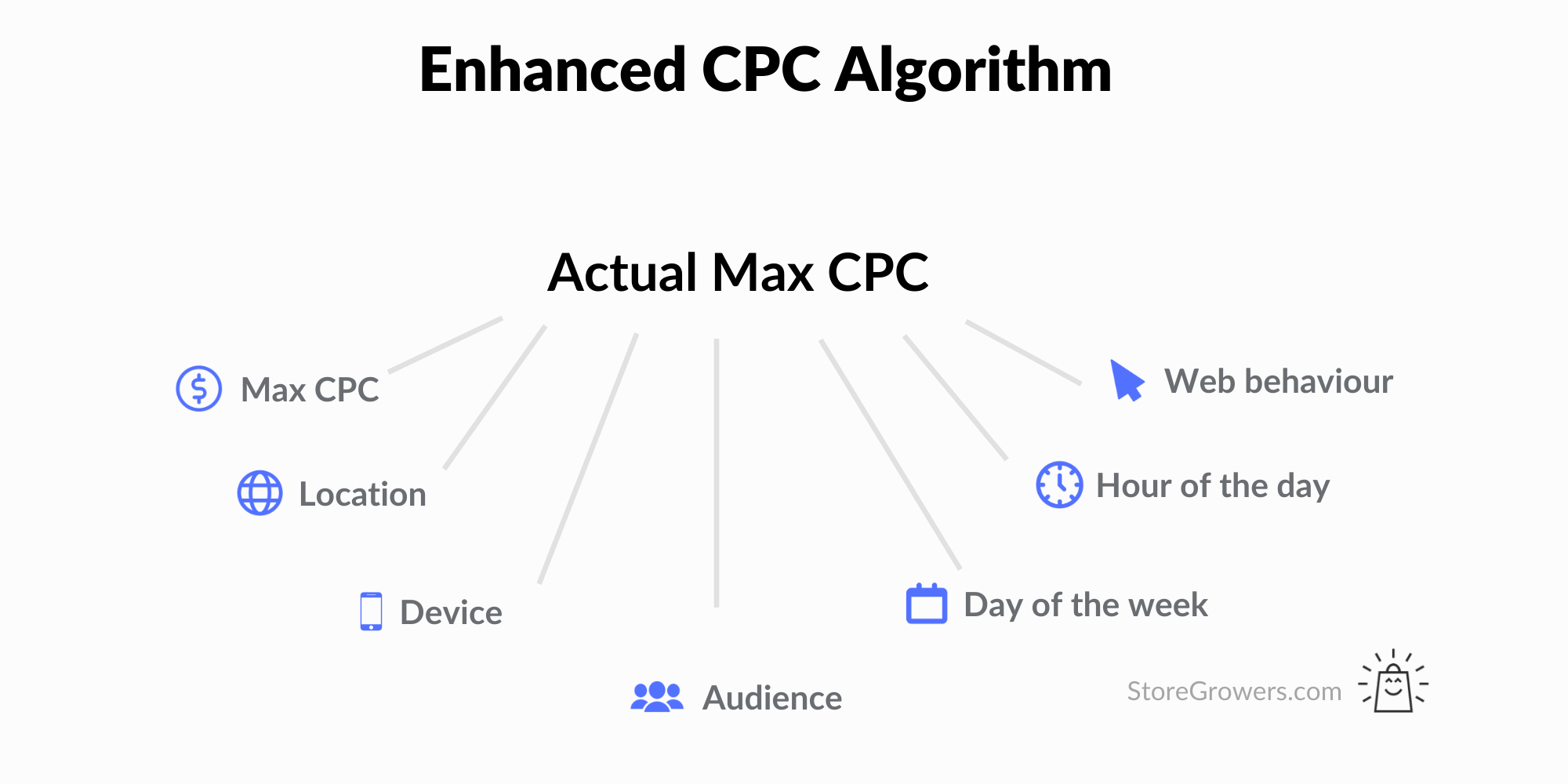Enhanced CPC is one of the most popular bidding strategies in Google Ads.
It’s one step up from manual CPC bidding.
So you still keep control over your bids, but you leverage some of the automation that Google has available.
In this article, we’ll take a closer look at what enhanced CPC actually is, how it works and in which scenarios it is most effective!
Table of Contents
What Is Enhanced CPC?
Enhanced CPC uses the maximum cost per click that you’ve set in your ad groups or keywords, but uses machine learning to increase or decrease that bid according to the likelihood that a click will lead to a sale.

It’s the simplest of Google’s automated bidding strategies (also known as Smart Bidding).
So in practice it works a lot like Manual CPC, but with some automation going on behind the scenes.
The main difference between the two bid strategies is that your ad group or keyword bid can increase if Google thinks it will lead to a conversion. So Google “enhances” your bid.
How Does Enhanced CPC Work?
Google is pretty vague about how the enhanced CPC algorithm actually works.
Here is my attempt at coming up with the signals they use to decide if a click is likely to lead to a sale.

Signals:
- Location
- Device
- Hour of Day
- Day of the Week
- Audience
- Web behaviour
This might not be very surprising. All but the last one are elements that you can actually control through bid adjustments.
Google just ups your ability to actually compare conversion rates for all of those combinations, in real time.
Technically you could crunch those some numbers after the fact and look at which combinations are most favourable.
But there are some parts where you come up short. That Web behaviour element basically is a mix of all the info Google has on you. They know if you regularly make purchases, they know how much you spend, and what you’re looking for right now.
Let’s say you were selling running shoes, and these two people could see your ad:
- Person A: searching from the New York suburbs, on a Tuesday at 8AM on her iPhone, female, aged 25-34, frequently purchases online from her cellphone, has been consuming a lot of content around about running
- Person B: searching from downtown Chicago, Saturday 3AM, Google doesn’t have any history or demographic info like age, gender
The algorithm works a lot more granular than this, but it’s clear that the likelihood of Person A converting is a lot greater than Person B. So Google would probably increase your bid to get a better position for your ad for Person A.
Google Ads used to have a limit of raising (or lowering) your bid by max 30%.
So a $1 max CPC could become $1.3.
But in recent years, they’ve removed this limit, and CPCs have gone up further.
Today, a $1 might turn into an average CPC of $1.78, without much control or insights over why this is happening.
In the Google support docs, I’ve also found an interesting tidbit on how Google actually A/B tests its guesses:
ECPC double-checks itself by leaving part of your traffic alone to work with your regular max CPC bids. Then it compares the two sets of results and adjusts accordingly.
But since we can’t really see the results of those tests, we’re going to have to trust Google.
Optimize for conversion value vs conversions
In 2020, Google added another option for Enhanced CPC, the ability to optimize for conversion value.

The approach is the same as before, but with this option , Google not only considers the likelihood of the actual conversion, but also the potential conversion value.
It does this by looking at the product or landing page that’s being promoted, and what those conversions are usually worth.
Especially if you’re in ecommerce, it’s worth testing the difference. I’ve seen it range from no difference to outperforming the Enhanced CPC Conversions option.
When to Use Enhanced CPC?
With so many bidding strategies to pick from, it’s not always easy to know which one is the best one.
That’s because there is no single “best” bid strategy. Each one has its merits and problems, as we’ll look at below.
But enhanced CPC is one that will work in most situations.
I’ve used it with brand new campaigns, and with campaigns I’ve been managing for 3 years.
It’s a good combination of keeping control over the cost per click, but giving Google a little bit leeway to adjust the bids. That gives a better idea of the potential.
For it to work well, you need the following:
- Set up conversion tracking (ideally with conversion values)
- Have some conversions in your campaign (Google recommends at least 20 conversions in your campaign)
You could use the ECPC bidding starting out, but without conversions, it will be hard for Google to know what to optimize. So as a rule of thumb, the more conversion data, the better results you can expect.
Enhanced CPC is available for Search, Shopping and Display campaigns.
However, Google only supports the conversion value option for Search and Shopping ads.
In short, Enhanced CPC can work in the following situations:
- You want to benefit from Google’s machine learning features but don’t want to sacrifice too much control over your ads.
- You don’t have the necessary conversion volume to use more automated bid strategies (e.g., Target CPA, Target ROAS).
- You want to save the time you have otherwise spent on adjusting and monitoring your bids with Manual CPC.
The best way to determine whether ECPC is a good fit is to start out with Manual CPC, change your bidding strategy to Enhanced, and compare the difference.
Pro tip: If you’re running a Search campaign, you can even run an experiment to A/B test the difference
Pros and Cons of Enhanced CPCs?
Below, I’ve collected the advantages and disadvantages of using Enhanced CPC as your bid strategy in Google Ads:
| Pros | Cons |
| More control over your bids than with other automated bid strategies | Still give up some control over your bids to Google |
| Benefit from Google’s machine learning features | For Enhanced CPC to work efficiently, you need to set up conversion tracking and have a decent history of conversions for your campaign |
| Chance to increase your conversions | Higher CPCs |
| Saves time compared to manual CPC | Still requires some bid management |
| Great stepping stone to other automated bid strategies | Need to trust Google |
How to Set Up Enhanced CPC in Google Ads?
Enhanced CPC is linked with Manual CPC, meaning that the two bid strategies are always used together.
You can set up ECPC by navigating to the bidding settings of a campaign and ticking the box “Help increase conversions with Enhanced CPC.”

After you are done, you will have to select whether to optimize your bids for conversions or conversion value.
Enhanced CPC vs. Maximize Clicks
While both are automated bid strategies in Google Ads, it’s easy to mix up Enhanced CPC and Maximize Clicks.
However, there are some fundamental differences between the two.
First, with Enhanced CPC, you still keep partial control over your bids. You set the maximum cost-per-click, but let Google tweak it when it might lead to a sale.
With Maximize Clicks, Google’s only concern is to get you as many clicks as possible for your budget. You have the option to set a max CPC limit, but apart from that you’re giving Google free reign (which can be a dangerous game!).
So in short, Enhanced CPC focuses on getting more conversions, and Maximize Clicks focuses on getting more clicks.
That’s why I rarely use the Maximize clicks bidding strategy in established campaigns. In terms of ROI, it doesn’t come close to other bid strategies.
I sometimes use it starting out to help with keyword research, and to evaluate bid levels.
How to Use Enhanced CPC Effectively
I hope this article helped to understand better what enhanced CPC is, how it works and when it is most effective.
Personally I find that it offers an acceptable trade off between control over your bids and taking advantage of Google’s automation.
Especially early on, when you’re still learning about your campaigns, having the little tweaks push your campaigns a bit harder can help to get a better idea of the potential.
It can also be a great stepping stone to leverage a bidding strategy like target ROAS.
But as always, every store is different. So it’s important that you test these things in your own campaigns.
Does Enhanced CPC outperform Manual CPC? Does the conversion value option produce additional benefits?
Do the test and be sure to let me know in the comments!
